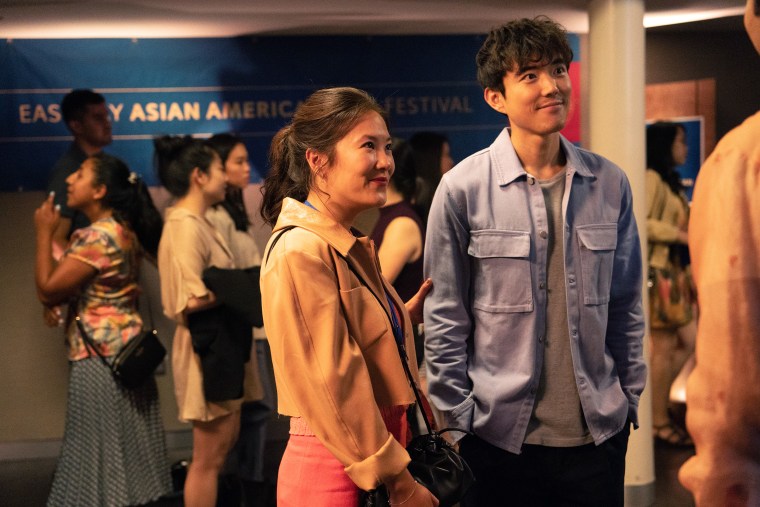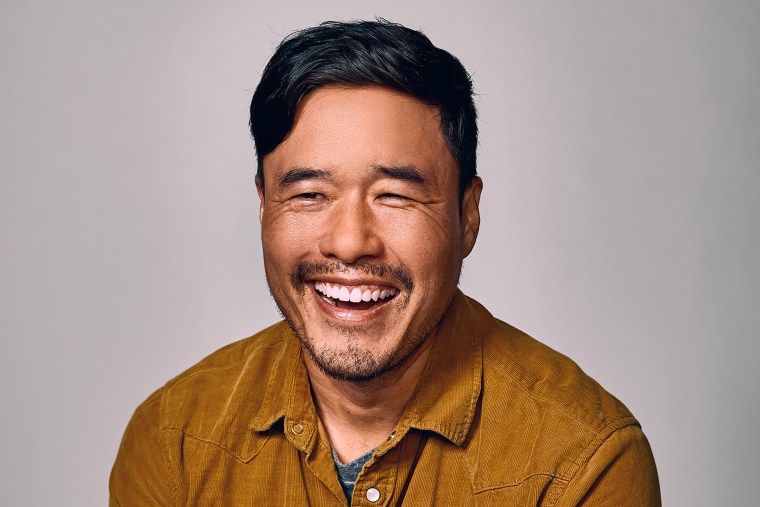Early in the upcoming Randall Park-directed film “Shortcomings,” couple Ben and Miko, both Asian Americans, bicker after watching a fictional film that mirrors 2018 blockbuster “Crazy Rich Asians.” An impassioned Miko argues the film is significant for the Asian community, while Ben claims it “glorifies the capitalistic fantasy of vindication through wealth and materialism.”
Park said the scene shows how valuable representation often means sitting in uncomfortable yet honest moments. In this case, the tension exposes a thorny debate, previously kept mostly within the confines of the community, about a blockbuster movie that’s been outwardly hailed as a cultural stepping stone for Asians in Hollywood.
The director told NBC News that it’s a feeling he experienced when reading Adrian Tomine’s graphic novel on which his film is based, and it’s an emotion he’s not afraid to lean into.
“It felt like there was an airing of dirty laundry in some ways. But it also felt just so real to me. It just felt like such an accurate reflection of the life of me and my friends at that time,” he said of the book. “I just wanted [the movie] to feel like a real reflection of real life and in the hopes that some audience members would feel that same kind of catharsis that I did when I first read that graphic novel.”

The film, which opens Friday and marks Park’s directorial debut, follows Ben, played by Justin Min, a Bay Area arthouse movie theater manager, who’s struggling with his own filmmaking career. When Miko, played by Ally Maki, takes an internship in New York and a break from their relationship, Ben is left to contend with what he truly wants out of life and love.
The journey of self-exploration doesn’t start with self-awareness either. Ben takes the relationship space as an opportunity to date, fulfilling his longtime obsession with white, blonde women while simultaneously harboring a deep resentment of white men. Meanwhile, he struggles with a toxic jealousy that prompts him to eventually take a trip across the country to search for Miko. Though Ben is largely driven by his feelings of isolation and bitterness, he exhibits glimpses of tenderness and self-reflection when challenged by his best friend Alice, a queer grad student played by Sherry Cola, who’s also trying to find her way.
Throughout the film, viewers are met with some of the grittier issues within the Asian American community — from internalized racism to the fetishization of Asianness — and the undercurrent of anger that can develop from these complicated dynamics. But, as Ben’s trajectory suggests, much of this frustrating behavior comes from a very human place, Park said.

“All the characters, I tried to come at with empathy and without judgment. … I don’t think any of the characters, particularly Ben, would work if you didn’t get a sense that all of this behavior comes from a place of heartache and loneliness and failure,” Park said. “They’re all so complicated and to be able to show Asian American characters who exist in such complexity was just so thrilling to me.”
Unlike many films tied to the Asian American experience, “Shortcomings” moves away from narratives focused around generational trauma, only briefly touching on the issue through Alice’s storyline. In fact, Park pointed out that not much is known about Ben’s family background. In some ways, the absence of the generational context shifts the onus and freedom to grow squarely on Ben, Park said.
“The power he has in this movie is the ability to change and to grow, and he’s resistant to that throughout the whole movie,” Park said. “Regardless of where these things come from, who made him this way, what experiences shaped him to be this way, he does have the option to mature and grow … and I think by the end, there’s some hope.”
It’s a unique time for such a directorial debut and film release, Park admitted. An ongoing strike by SAG-AFTRA bars actors who are union members from promoting films released by major studios. It also coincides with a time when Asian American projects and actors are gaining momentum in Hollywood, with recent projects like “Everything Everywhere All At Once” and “Past Lives” earning critical acclaim across the industry.
As actors demand improved terms, including increased baseline compensation and artificial intelligence regulations, Park emphasized that those in the industry can’t afford to wait for better conditions.
“I do strongly feel that this strike has to happen right now, regardless of where we’re at as a community,” he said. “Technology changes so fast. … Without any kind of rules in place, people will lose work. And on top of that, being able to make a living wage as a working actor — it feels very urgent right now.”
Park said he doesn’t fear any possibility of the Asian American movement losing steam.
“However long the strike takes, I think Asian Americans are very motivated and conscious of the time we’re in right now and the opportunity to expand on the stories that we’ve already been telling,” he said. “I feel like we’re gonna keep pushing no matter what, and I think that’s a good thing.”
